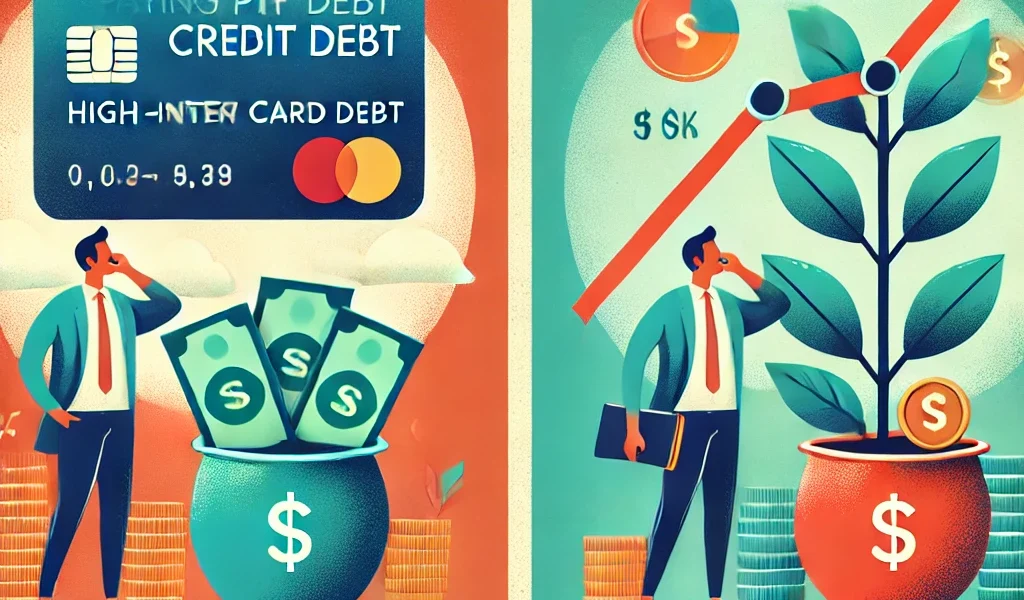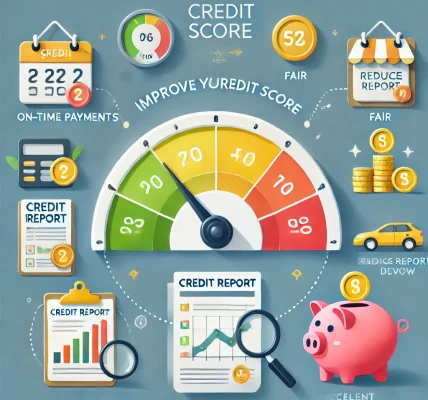Introduction
One of the biggest dilemmas in personal finance is deciding whether to pay off debt or invest extra money. Both options have advantages and can significantly impact your financial future. The right choice depends on several factors, including interest rates, financial goals, and risk tolerance. In this guide, we’ll explore when it makes sense to focus on debt repayment, when investing should be prioritized, and how to find the right balance between the two.
Understanding the Key Factors
Before deciding whether to pay off debt or invest, consider the following financial factors:
- Interest Rates on Debt vs. Expected Investment Returns
- High-interest debt (e.g., credit cards with 15-25% APR) should generally be paid off first because it accumulates faster than most investment returns.
- Low-interest debt (e.g., mortgages or student loans under 5%) may be manageable while investing simultaneously.
- The stock market historically averages a 7-10% annual return, but returns are not guaranteed.
- Risk Tolerance and Financial Security
- Paying off debt provides guaranteed savings by eliminating interest payments.
- Investing involves risk but offers the potential for higher long-term gains.
- If you are risk-averse, reducing debt may provide peace of mind.
- Cash Flow and Emergency Fund
- If paying off debt leaves you with little cash flow, it may not be the best strategy.
- Having an emergency fund (3-6 months of expenses) ensures financial security before aggressively paying debt or investing.
When to Prioritize Paying Off Debt
Paying off debt should be your priority if:
- The interest rate on your debt is high (above 6-7%).
- Your debt-to-income (DTI) ratio is too high, making it difficult to get approved for loans or credit.
- You want a stress-free financial life, as debt can cause mental and emotional strain.
- You have variable interest rates, which could rise over time and increase your burden.
When to Focus on Investing
Investing may be a better option if:
- You have low-interest debt (such as a mortgage at 3-4%).
- Your employer offers a 401(k) match, which is essentially free money you shouldn’t miss.
- You have a long investment horizon, allowing your money to grow and compound over time.
- You want to take advantage of tax-advantaged accounts like IRAs, 401(k)s, or HSAs.
Striking the Right Balance
For most people, the best approach is a balanced one. Here’s how you can manage both:
- Pay off high-interest debt first, while still contributing a small amount to investments.
- Invest in employer-matched retirement plans, as this is essentially a 100% return on investment.
- Once high-interest debt is gone, split extra money between additional debt payments and investments.
- Consider refinancing or debt consolidation to lower interest rates and free up cash for investing.
Practical Example: A Balanced Strategy
Imagine you have an extra $1,000 per month and:
- A credit card balance with a 20% interest rate.
- A student loan with a 5% interest rate.
- An employer offering a 50% 401(k) match.
A smart strategy could be:
- Pay off the credit card debt aggressively to eliminate the high-interest burden.
- Contribute enough to your 401(k) to get the employer match (this is free money!).
- After clearing credit card debt, split funds between extra student loan payments and investing.
Conclusion
Deciding between paying off debt and investing depends on your financial situation, goals, and risk tolerance. High-interest debt should always be a priority, but if your debt has a low-interest rate, investing early can yield significant benefits. The key is to find a balance that allows you to achieve financial stability while building wealth for the future.




